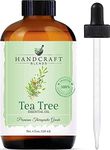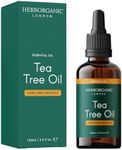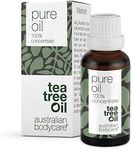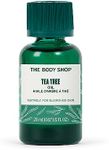Buying Guide for the Best Tea Tree Oils
Choosing the right tea tree oil can be a bit overwhelming given the variety of options available. Tea tree oil is known for its antiseptic properties and is commonly used for skin care, hair care, and even as a natural cleaning agent. When selecting a tea tree oil, it's important to consider factors such as purity, concentration, and intended use to ensure you get the most benefit from your purchase. Understanding these key specifications will help you make an informed decision that best suits your needs.PurityPurity refers to how unadulterated the tea tree oil is. Pure tea tree oil is 100% natural and free from additives or synthetic ingredients. This is important because pure oil is more potent and effective. When navigating purity, look for labels that state '100% pure' or 'therapeutic grade.' If you plan to use the oil for skin or hair care, a pure product is generally recommended to avoid irritation from additives. However, if you're using it for cleaning purposes, a slightly diluted version might be sufficient.
ConcentrationConcentration indicates the strength of the tea tree oil. It is often expressed as a percentage, with 100% being undiluted. Higher concentrations are more potent and can be more effective for treating skin conditions like acne or fungal infections. However, they can also be more irritating, especially for sensitive skin. If you have sensitive skin or are new to using tea tree oil, you might want to start with a lower concentration or dilute the oil with a carrier oil. For cleaning purposes, a higher concentration might be more effective.
SourceThe source of the tea tree oil refers to where and how the tea tree plants are grown and harvested. This can affect the quality and efficacy of the oil. Oils sourced from organic farms or sustainable practices are often preferred as they are less likely to contain pesticides or harmful chemicals. If environmental impact and sustainability are important to you, look for oils that are certified organic or sustainably sourced. This ensures that you are getting a product that is both effective and environmentally friendly.
PackagingPackaging is important because it affects the shelf life and potency of the tea tree oil. Dark glass bottles are ideal as they protect the oil from light, which can degrade its quality over time. When choosing tea tree oil, opt for products that come in dark amber or cobalt blue glass bottles. This is especially important if you plan to store the oil for an extended period. Additionally, a dropper or a secure cap can help in controlling the amount of oil you use, preventing waste and ensuring safety.
Intended UseIntended use refers to what you plan to use the tea tree oil for, which can guide your choice. Tea tree oil can be used for a variety of purposes, including skin care, hair care, aromatherapy, and cleaning. If you're using it for skin or hair, consider oils that are specifically labeled for these purposes, as they may be formulated to be gentler. For cleaning, a more concentrated oil might be more effective. Understanding your primary use will help you select an oil that is best suited for your needs.














